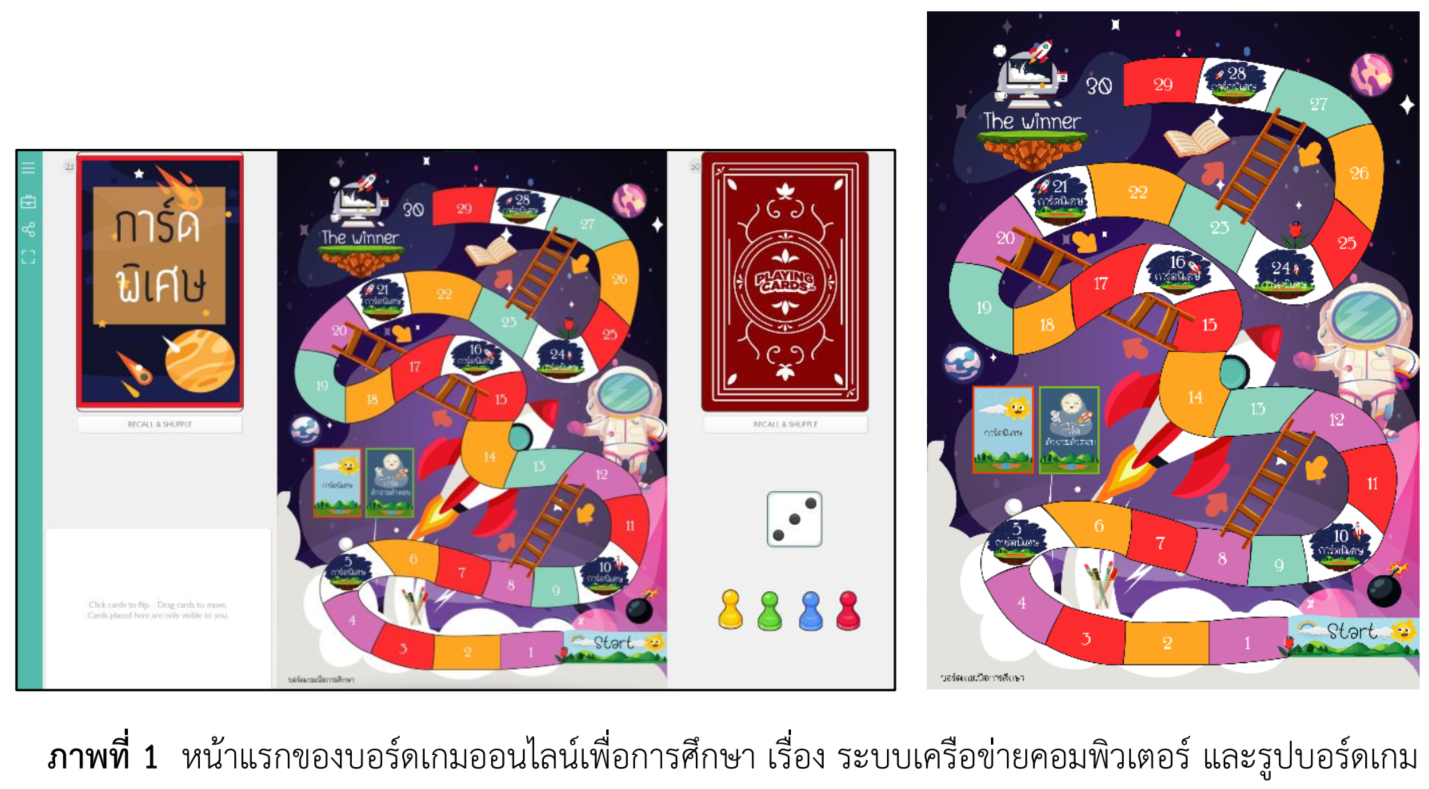การพัฒนาบอร์ดเกมออนไลน์เพื่อการศึกษา เรื่อง ระบบเครือข่ายคอมพิวเตอร์
คำสำคัญ:
บอร์ดเกมเพื่อการศึกษา, ผลสัมฤทธิ์ทางการเรียน, เครือข่ายคอมพิวเตอร์, บอร์ดเกมออนไลน์บทคัดย่อ
วัตถุประสงค์ของงานวิจัยในครั้งนี้ คือ 1) เพื่อพัฒนาบอร์ดเกมเพื่อการศึกษา เรื่อง ระบบเครือข่ายคอมพิวเตอร์ 2) เพื่อหาประสิทธิภาพบอร์ดเกมเพื่อการศึกษาให้ได้ตามเกณฑ์ 80/80 3) เพื่อเปรียบเทียบผลสัมฤทธิ์ทางการเรียนของผู้เรียนกลุ่มที่เรียนด้วยบอร์ดเกมออนไลน์เพื่อการศึกษาและกลุ่มที่เรียนด้วยวิธีปกติ และ 4) เพื่อศึกษาความพึงพอใจของผู้เรียนที่มีต่อบอร์ดเกมเพื่อการศึกษา กลุ่มตัวอย่าง คือ นักศึกษาระดับปริญญาตรี สาขาคอมพิวเตอร์ศึกษา จำนวน 60 คน ได้จาการสุ่มตัวอย่างแบบกลุ่ม โดยใช้ทดสอบกลุ่มตัวอย่าง 2 กลุ่ม ประกอบด้วยกลุ่มทดลอง จำนวน 30 คน และกลุ่มควบคุมจำนวน 30 คน การวิเคราะห์ข้อมูลโดยใช้ค่าเฉลี่ย ส่วนเบี่ยงเบนมาตรฐาน และทดสอบค่าทางสถิติ t-test แบบ Independent
ผลการวิจัยพบว่า 1) ผลการพัฒนาบอร์ดเกมออนไลน์เพื่อการศึกษา มีค่าดัชนีความสอดคล้อง IOC เท่ากับ 0.97 แสดงว่าบอร์ดเกมออนไลน์เพื่อการศึกษา มีความเที่ยงตรงและความสอดคล้องของเนื้อหาของบทเรียน และการประเมินคุณภาพค่าเฉลี่ยเท่ากับ 4.90 อยู่ในเกณฑ์ระดับมากที่สุด 2) ประสิทธิภาพของบอร์ดเกมออนไลน์ มีค่าเท่ากับ 80.00/90.67 เห็นได้ว่าค่าประสิทธิภาพเป็นไปตามเกณฑ์ที่กำหนดคือ 80/80 3) ผลสัมฤทธิ์ทางการเรียนหลังเรียนของกลุ่มนักศึกษาที่เรียนรู้ด้วยบอร์ดเกมออนไลน์เพื่อการศึกษา และกลุ่มนักศึกษาที่เรียนด้วยวิธีปกติ แตกต่างกันอย่างมีนัยสำคัญทางสถิติที่ระดับ 0.05 และ 4) นักศึกษามีความพึงพอใจต่อบอร์ดเกมออนไลน์เพื่อการศึกษาในระดับมากที่สุด
เอกสารอ้างอิง
Bilbai, S., & Thanamai, S. (2014). Computer games and learning in the digital age. Technical Education Journal King Mongkut’s University of Technology North Bangkok, 5(1), 177-182. Retrieved from https://ojs.kmutnb.ac.th/index.php/jote/article/view/3205/2502 (In Thai)
Boss Lab Board Game. (2019). 5 buttons of learning game board design. Retrieved December 9, 2020, from https://web.facebook.com/bosslabboardgame (In Thai)
Jantarasakul, S., & Thaweesuk, K. (2023). Using Games to Promote Correct Thai Language Usage by Students of Ratchaprachanukroh School 41, Yala province. Journal of Humanities and Social Sciences Mahasarakham University, 42(4), 620-631. Retrieved from https://so03.tci-thaijo.org/index.php/humsujournal/article/view/264371/180396 (In Thai)
Kunwanicho, N., & Paiboonphanicho, A. (2022). Learning Achievement and Satisfaction in Teaching Binomial Distribution using “Sue-hirokari Sukoroko” Board Game. KKU Science Journal, 46(3), 572–584. Retrieved from https://ph01.tci-thaijo.org/index.php/KKUSciJ/article/view/249929 (In Thai)
Laohajrasaeng, T. (1998). Computer assisted instruction. Bangkok: Wongkamon Productions Co., Ltd (In Thai).
Office of the Education Council. (2017). National Education Plan 2017 – 2036. Bangkok: Phrikwan Graphic Company Limited. Retrieved from http://backoffice.onec.go.th/uploaded/Outstand/2017-EdPlan60-79.pdf (In Thai)
Phromwong, C. (1990). Educational Technology and Communication Volumes 1-5. Bangkok: Agricultural Cooperative Printing Office of Thailand. (In Thai).
Prachachat Online. (2018). Learning through board games Banpu B-Sports Thailand. Retrieved December 9, 2020, from https://www.prachachat.net/csr-hr/news-237822 (In Thai)
Rodkroh, P. (2017). Research and development of a problem-based learning digital game to enhance problem solving ability in science subject for elementary students. In Thesis in Education. Graduate School. Chulalongkorn University. Retrieved from http://doi.org/10.14457/CU.the.2015.1114 (In Thai)
Srisa-ard, B. (2002). Basic research (7th ed.). Bangkok: Suwiriyasan (In Thai).
Trongthiang, N. (2019). Policy statement of the Cabinet. Bangkok: Cabinet and the Royal Gazette. Retrieved from https://www.thaigov.go.th/uploads/document/66/2019/07/pdf/Doc_20190725085640000000.pdf (In Thai)
Yamkruan, L. (2016). Designing and developing learning games for mathematics. Grade 6. In Thesis in The Master of Information Science degree. Information Technology major Suranaree University of Technology. Retrieved from http://sutir.sut.ac.th:8080/jspui/handle/123456789/7514 (In Thai)

ดาวน์โหลด
เผยแพร่แล้ว
รูปแบบการอ้างอิง
ฉบับ
ประเภทบทความ
สัญญาอนุญาต
ลิขสิทธิ์ (c) 2024 มหาวิทยาลัยราชภัฏสวนสุนันทา

อนุญาตภายใต้เงื่อนไข Creative Commons Attribution-NonCommercial-NoDerivatives 4.0 International License.
บทความที่ได้รับการตีพิมพ์เป็นลิขสิทธิ์ของ สถาบันวิจัยและพัฒนา มหาวิทยาลัยราชภัฎสวนสุนันทา
ข้อความที่ปรากฏในบทความแต่ละเรื่องในวารสารวิชาการเล่มนี้เป็นความคิดเห็นส่วนตัวของผู้เขียนแต่ละท่านไม่เกี่ยวข้องกับมหาวิทยาลัยราชภัฎสวนสุนันทา และคณาจารย์ท่านอื่นๆในมหาวิทยาลัยฯ แต่อย่างใด ความรับผิดชอบองค์ประกอบทั้งหมดของบทความแต่ละเรื่องเป็นของผู้เขียนแต่ละท่าน หากมีความผิดพลาดใดๆ ผู้เขียนแต่ละท่านจะรับผิดชอบบทความของตนเองแต่ผู้เดียว




